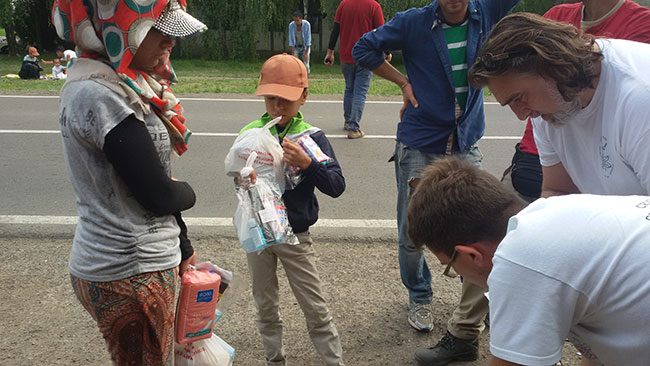Belgrade, 3 September 2015 – The EU started the distribution of humanitarian aid through the Red Cross of Serbia today to assist the most vulnerable refugees in Serbia
The distribution of EU humanitarian assistance in food, water and hygiene items, including special packages for babies, started today. The aid is delivered by the Serbian Red Cross to the most vulnerable refugees and families with children in Subotica, Kanjiza, Negotin and Zajecar.
Head of Delegation of the European Union to the Republic of Serbia Ambassador Michael Davenport welcomed the news: “The EU is showing solidarity with Serbia once again. I am delighted that we were able to mobilise funds and start the distribution of humanitarian assistance within two weeks after receiving a request for assistance from the Serbian authorities. I am deeply moved by the human sympathy and solidarity shown by the Serbian people towards the refugees over these past weeks. The Serbian authorities have also shown immense dedication to deal with this crisis and to help people in need. We will continue to cooperate closely with the authorities as well as with the Serbian Red Cross and other international organisations in addressing the growing needs of the refugees and migrants in Serbia.” said ambassador Davenport.
This first humanitarian aid package worth €150,000 is provided by EU’s Humanitarian Aid and Civil Protection directorate (ECHO). This support is channelled through the Disaster Relief Emergency Fund (DREF) of the International Federation of Red Cross and Red Crescent Societies (IFRC) and distributed by the Red Cross of Serbia. It will provide the most necessary aid to refugees, migrants and asylum seekers over the next three months in Presevo, Bujanovac, Subotica, Kanjiza, Zajecar, Negotin and Pirot.
Background:
Additional immediate funding from the European Union for Serbia
The European Commission on Wednesday 26 August granted an additional €1.5 million in emergency aid to help the refugees and migrants flooding into Serbia and the Former Yugoslav Republic of Macedonia through ECHO. This aid will include drinking water, hygiene, health care, winterisation and basic protection for the most vulnerable people, including families with small children and unaccompanied minors. This aid will be channelled through ECHO partners on the ground that will be identified in the coming days after a projects selection.
The EU Delegation to Serbia is also providing €240.000 from the European Progres programme for additional needs for refugees and migrants. This aid will be able to address additional needs such as waste disposals, water and sanitation and other needs which are currently being identified in cooperation with the Ministry of Labour, Employment, Veteran and Social Policy as well as the Commissariat for Refugees.
Long lasting EU-Serbia partnership in the area of migration and border management
In the medium and long-term, the EU will continue supporting the reform of Serbia’s asylum system and improving border controls. Projects are already being implemented or will start within the next year:
- €3.2 million will be used to expand existing accommodation capacities for migrants in Serbia.
- An EU twinning project of €1 million is already ongoing with a focus on drafting a new law on asylum and stepping up the reform of the asylum system.
- €4 million have been allocated to further develop Serbia’s border surveillance systems
A regional programme worth €8 million is also under preparation to deal with protection-sensitive migration management in the Western Balkans and Turkey, mainly related to Serbia and the former Yugoslav Republic of Macedonia.
Since 2001, the EU has acted as Serbia’s main partner and donor when it comes to managing migration having allocated some €80 million for borders and migration. This assistance includes, amongst others, construction and renovation of border crossings, supply of equipment and IT infrastructure for better border management, upgrade and extension of asylum facilities as well as assistance to improve the efficiency of the asylum system.
Long lasting EU-Serbia partnership in resolving the question of refugees and internally displaced people
Since the year 2000, the European Union has acted as Serbia’s main partner and donor when it comes to dealing with refugees and internally displaced people. The EU has already donated over €74 million to help displaced people and families by providing housing, employment or legal aid. The EU is working closely with the Commissariat for Refugees of the Republic of Serbia to provide new housing solutions for refugees and internally displaced people who still live in the remaining 10 collective centres in Serbia.
Furthermore, the EU is the biggest contributor towards the Regional Housing Programme, a joint initiative of Bosnia and Herzegovina, Croatia, Montenegro and Serbia whose aim is to contribute to resolving the protracted displacement situation of the most vulnerable refugees and internally displaced people following the 1991-1995 conflicts in former Yugoslavia. This regional programme aims to benefit close to 74,000 people or 27,000 households; its total cost over a five-year period is estimated to be approximately €584 million out of which the EU has donated €259 million.
More about EU assistance for refugees and internally displaced people in Serbia can be found here.
About the Disaster Relief Emergency Fund (DREF)
The Disaster Relief Emergency Fund (DREF) is supported by contributions from donors. Each time a National Red Cross or Red Crescent Society needs immediate financial support to respond to a disaster, it can request funds from the DREF. For small-scale disasters, the IFRC allocates grants from the Fund, which can then be replenished by the donors. The contribution agreement between the IFRC and the European Commission’s Humanitarian Aid and Civil Protection department (ECHO) enables the Commission to replenish the DREF for agreed humanitarian operations up to a total of €3 million.
For further information, please contact:
Nadezda DRAMICANIN, EU Delegation Serbia, at +381 (0)11 3083 264 and Nadezda.DRAMICANIN@eeas.europa.eu




